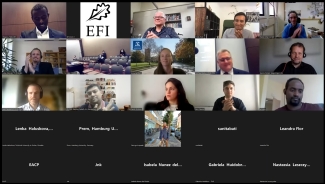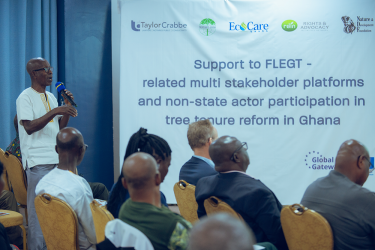Assessing the effects of international forest policies

PhD candidate Fredy Polo writes about the joined hybrid side event organised by the Center of International Forestry Research – World Agroforestry Center (CIFOR-ICRAF), the European Forest Institute (EFI), and the Technical University of Dresden (TUDresden) at the XV World Forestry Congress in Seoul, Korea.
Over the last decades, large areas of forest have been deforested and degraded worldwide. To respond, several international policy approaches and instruments have emerged. Although many of them are being widely implemented, there is less agreement about their impacts. Due to this, leading forest research institutions - EFI, CIFOR-ICRAF, and Technical University Dresden/Germany - joined forces to organised a side-event on the XV World Forestry Congress in order to share experiences on analysing the impacts of two major international forest governance initiatives: The EU's Forest Law Enforcement, Governance and Trade Action Plan (FLEGT); and Reducing Emissions from Deforestation and Forest Degradation in Developing Countries, and the role of conservation, sustainable management of forests and enhancement of forest carbon stocks in developing countries (REDD+).
The side-event entitled "Evaluating policy impacts: How to best assess the effectiveness of international forest policy?" took place on Wednesday 4 May between 18:30-20:00 KST (UTC/GMT +9) in a hybrid format in Seoul, and aimed to discuss pros and cons of different methodological approaches that scientifically evaluate the impacts of forest policy interventions and explore options to combine different methods to gain better evidence. The session was moderated by Dr. Yitagesu Tekle (EFI, NewGo!), who was also in charge of opening the event by introducing the panellists. Then, Prof. Lukas Giessen (TU Dresden) set the scene highlighting the importance of both the design of scientific methodologies to demonstrate causal links between policies and their effects, and the exploration of both expected and unexpected policy impacts.
Thereafter, four presentations were given by scientists. The first two presentations focused on the impacts of the Volunteer Partnership Agreements of the FLEGT Action Plan (FLEGT VPAs). While Dr Michael Brady (CIFOR-ICRAF), based on research conducted by Dr. Paolo Cerutti (CIFOR-ICRAF) and MSc. Jean Newberry (CIFOR-ICRAF), explained the perceptions-based approach that they used to assess FLEGT VPA effects; MSc. Fredy Polo (TUDresden) presented how he also unveiled such effects by systematically reviewing the scientific literature reporting on them. Following, the last two presentations focused on the REDD+ initiative: Dr. Sven Wunder (EFI, NewGo!) presented a rigorous quantitative assessment of the effects of the initiative, and Dr. Anna Sanders (Uni Melbourne) presented her research using qualitative ethnographic approaches to understand these effects. Subsequently, during the panel discussion session, the challenges encountered both in communicating policy impact assessments to decision makers and in studying the impacts of the interaction of different governance initiatives, as well as the limitations of the different methodological approaches presented, were discussed among the panellists and the audience.
Finally, Prof. Georg Winkel (Wageningen University & Research) concluded the session by highlighting that future policy impact assessments must seek to: 1) clearly identify the problem that each policy does (or does not) seek to solve, 2) include non-scientific knowledge as data source, 3) increase the interdisciplinarity of the studies, 4) combine “large” and in-depth methods, 5) assess expected and unexpected impacts, and 6) be humble and aware of their methodological limitations.
Watch the recording of the event:


